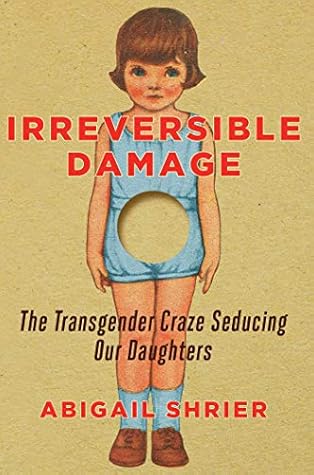More on this book
Community
Kindle Notes & Highlights
“Probably, your guidance counselor, social worker, doctor, therapist, psychiatrist, parent, school teacher, told you that this is a good idea or supported that this is a good idea or helped you hash out why this would be good for you. This is not something that you came to the decision on your own—especially if you were under eighteen, you were like a child. Other people should have been looking out for your well-being.”
Many detransitioning young women have since come to believe they were just young lesbians who had internalized homophobia and been led to believe that not being typically feminine meant they weren’t female at all.
if anyone excels at reinvention, it’s you. Reports of your death have been greatly exaggerated. That’s no small thing.
when we see these kids all speaking the same language, all doing the same thing, all wanting to transition right away, they think it’s a fix. That’s what they think. They think ‘It’s going to fix everything about the way I feel about myself.’… And that’s the dangerous part. It’s not going to fix everything until you fix your brain.” Buck was one of the first transsexuals to medically transition from female-to-male in Los Angeles.
Buck faults the trans community for not being more skeptical of the sudden epidemic of adolescent girls claiming to be trans. “How can we not question it? How can our own community not question it? That’s the part that I’m a little bit upset about; my own community not saying, Hey, we need to take responsibility for these children.”
Trans identification may be celebrated as a moment of liberation, but for many teens suddenly identifying, it very often seems to be a sad cult of asexuality, like the hand-painted sign in an antique shop reading “Please Do Not Touch.”
Are these kids having sex, as far as Buck knows? No, he told me—they’re not. Is this all an act of sexual withdrawal and avoidance? I asked him. Yes, he thought it might be. It bothers him a lot.
Despite the dignity and grace of so many women, the path to womanhood is neither easy nor elegant. Perhaps forever, but at least since Shakespeare’s Viola arrived shipwrecked in Ilyria and decided to pass herself off as a man, it has occurred to young women: it’s so much easier to be a boy.
Though it’s often considered insulting to note, women in the aggregate have different preferences: we tend to put “people jobs” over “thing jobs,” as someone once put it to me.2 This has caused feminists a great deal of consternation. Pricked by the embarrassment of natural differences between men and women, they blame society and insist women need to be taught to adopt different preferences. But behind this insistence lies the idea that women’s preferences are inferior. Young girls are left to conclude that they must strive to be more like men—they must close the novel they were enjoying and
...more
Nothing I have written here should be taken to discourage young women from wanting to become CEOs or math professors. (Does this even need to be said?) The point is only that women need to own up to a hard truth: We assume—so often, so immediately— that the guys have it better, that whatever men want must be better, too.
Nearly every novel problem teenagers face traces itself back to 2007 and the introduction of Steve Jobs’s iPhone. In fact, the explosion in self-harm can be so precisely pinpointed to the introduction of this one device that researches have little doubt that it is the cause.
Our true sexuality is not an identity we choose online, but a feeling of attraction that emerges and even evolves over time. Understanding it requires us to go into the world, to have in-person experiences with other people.
Girls are different. They are not defective boys simply because they sometimes fail to be single-mindedly self-interested, especially in the face of their friends’ announced need or genuine suffering. They are possessed of a different set of inclinations and gifts—a whole range of emotions and capacities for understanding that boys, in general, are not. If only we didn’t make them feel so bad about this.
A young woman’s unruly emotions in her teenage years—the whirlwind fury and self-doubt of female adolescence—may be a feature, not a flaw. That doesn’t mean a parent shouldn’t set boundaries or punish bad behavior. But absent a serious mental health problem, neither should a parent strive to banish all her daughter’s ups and downs.
woman’s emotional life is her strength. A key task of her adolescence must be to learn not to let it overwhelm her. A key task of maturity is to learn not to let it fade away. We need to stop regarding men as the measure of all things—the language they use, the kind of careers they pursue, the apparent selfishness of which we are so endlessly envious.
Becoming a woman means losing a body almost indistinguishable from a boy’s in terms of strength and solidity and growing into one that is softer, more sexually inviting, but more vulnerable, too. For the first few years, you can feel like a hermit crab who has outgrown a shell it must then abandon, blindly scurrying for another. The armor you eventually take up is of a different sort. You can no longer credibly challenge the boys to an arm-wrestling match and expect to win. Forced to rely on subtler talents, you develop them. You learn to strike with a glance; you learn to soothe with one,
...more


